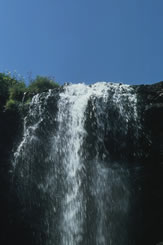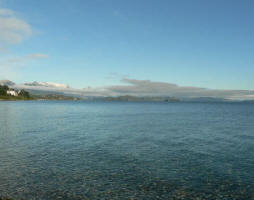 Marseilles Recommendations, 1996
Marseilles Recommendations, 1996
| Released | 03/03/2006 |
|---|
Recommendations
selected by the experts
Preamble
A global and sustainable management of water resources by each of the partners in the Mediterranean Basin that aims at optimally meeting the rational needs of the various users, within the limits of available resources while protecting the aquatic ecosystems, requires the strengthening of the competencies and institutions concerned.
-
People's secure supply of drinking water must always be given priority. Special attention must be paid to the underprivileged.
-
Sustainable increased agricultural productivity can only be achieved by making an optimized use of the scarce water resources, taking into account the sustainable management of the water and land resources and limiting undesirable environmental impacts.
-
The competence and awareness of different actors is an essential condition for a good water management, and requires significant means of training and information.
Particular recommendations
Water management for sustainable agriculture
The authorities should base the framework for a sustainable agricultural development on the establishment and implementation of a planning policy and its related legal framework and regulations. Application of modern technologies, like Decision Support Systems (DSS) and Geographic Information Systems (GIS), in planning policy would have to be promoted to support this strategy.
There is a direct relationship between the quality of service - including an efficient management by Agencies and/or Water Users Associations - and the rate of the fee for water or the price for the service. The cost of the service would have to be progressively recovered from the users.
Environmental protection related to water management in irrigated and drained areas and proper use of non conventional water resources have to be assured by authorities, agencies and users. This requires, among others, an effective monitoring and control of the environmental impacts of water management. Regarding non conventional water resources development, focus would have to be made on the careful reuse of treated wastewater and use of low quality water.
The opening to the World market and the liberalization in
agriculture will have positive and negative consequences for water
management which would have to be investigated for the whole Mediterranean
region. Adjustment programmes may have to be developed to assure positive
effects on investments, farmers income and water resources
development.
Domestic and industrial water
- Water conservation measures to include leakage control and, if necessary, investment in mains rehabilitation, replacement or restructuring should constitute an important objective.
- Appropriate tariffing should be applied, with regard to the real investment and operating costs of water supply services and sewerage services as well as incentives for savings in consumption and reduction of polluting discharges. Mechanisms to establish solidarity between the various categories of users should be developed.
- The cooperation of Mediterranean and European partners in the water
sector, when possible, should be developed on various fields, particularly
new technologies, the use of non-conventional resources, exchange of
information and research results, methods of monitoring water
quality.
Basic and continued training for professionals in the water sector
- The creation and development of capabilities for basic and continuing professional training is a must.
- Training must be reinforced at all hierarchical levels, and for all professions, insisting on the practical approaches of the courses oriented towards the on-the-job apprenticeship.
- Short and long term training plans have to be developed and the means, mainly financial, necessary for their realization, need to be found, since training is expensive.
- Collaboration between centres of excellence in the various specialities and the facilitation of the creation or reinforcement of professional technological centres has to be favoured, in the framework of a regional training cooperation programme, for the fast training of the trainers and the production of the necessary educational material.
Strengthening of institutions
It is important to be aware of the time needed for the implementation of the recommendations herein after.
- A clear and stable legal and institutional framework should be established by each of the partners, referring to a system of common terminology and useful standards in order to favour a clear global approach for the different users.
- Decentralization of competences and responsibilities is necessary to bring the decision making process closer to local realities as well as the creation or the reinforcement of structures, encouraging the participation of local authorities and associations of users.
- It particularly encourages, whenever possible, the organization of the management of the resources on appropriate hydrological and geographical scales, subject to existing and futures agreements between the interested parties.
- The economic value of water must be taken into account. It is recommended that prices be adjusted according to the uses, the development of multiannual programming tools, the application of "user polluter pays" principle allowing for balanced management.
- Development and modernization of measuring and analysis tools, setting up of data banks which are reliable, accessible, understandable and comparable are indispensable. Data will deal with the state of resources both in terms of quality and quantity, as well as with the uses and discharges and with their seasonal and geographical variations, so as to generate a system of common references in order to efficiently follow polices.
General Recommendations
Information and awareness of decision-makers and the population
Action programmes must be specifically organized to facilitate access to useful information under appropriate forms, for local elected officials, socio-professional representatives or heads of NGO's.
Public awareness programmes must be organized to give the population some basic notions on water saving and on a good management of water resources.
Exchange of documentation
The creation of an exchange system of economic, institutional and technical documentation between specialized "relay documentation centres", that would be responsible for its collection and distribution, is a necessity.
In harmony with the existing and future cooperation
agreements, the decentralized cooperation, like the networking of the
partners concerned with regional cooperation, is an efficient mean for a
sustainable water management. Cooperation between participants and
institutions of the Mediterranean Basin and Europe must allow for the
speeding up of the ongoing adjustments, by crossed fertilization, based on
the exchange of experiences.
 you are not logged in
you are not logged in





